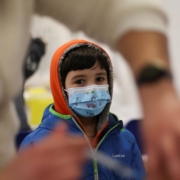Scientists from the University of Virginia revealed the discovery of 17 total genes directly implicated in the development of obesity, an important breakthrough as the Covid-19 pandemic has escalated this persistent and often-overlooked crisis.
British scientists identified a version of a gene that may be associated with double the risk of lung failure from Covid-19, a finding that provides new insights into why some people are more susceptible than others to severe illness and which opens possibilities for targeted medicine.
A new study shows the persistent syndrome of Covid-19 after-effects known as long Covid can develop after “breakthrough” infections in vaccinated people. Other new findings suggest a gene that helps the coronavirus reproduce itself might contribute to life-threatening Covid-19 in young, otherwise healthy people.
The National Institutes of Health (NIH) reports that a common and potent diuretic might hold the key to lowering the prevalence of Alzheimer’s disease, particularly in people who are genetically predisposed to the illness.
A combination of Mirati Therapeutics Inc.’s genetic mutation-targeting adagrasib and Eli Lilly and Co.’s older cancer drug Erbitux shrank tumors in 39 percent of patients with advanced colorectal cancer treated in a small trial, the company said on Sept. 19.
A group of scientists from the Nuffield Department of Women’s & Reproductive Health at Oxford University may have found a potential key to finally treating endometriosis, a disease that affects around 176 million women worldwide.
Merck won U.S. Food and Drug Administration approval for a first-of-its-kind oral hypoxia-inducible factor-2 alpha (HIF-2α) inhibitor that is used to treat a rare genetic disease that causes benign and cancerous tumors in blood vessels associated with renal cell carcinoma.
Regeneron Pharmaceuticals Inc. and AstraZeneca today announced that the companies entered into a collaboration to research, develop and commercialize small molecule compounds directed against the GPR75 target with the potential to treat obesity and related co-morbidities.
J&J shot recipients may need a booster; new advice on infected kids
Common Cold, COVID-19 booster shots, COVID-19 Infections, COVID-19 protocols, COVID-19 Vaccinations, Covid-19 Variants, Genes, Janssen COVID-19 Vaccine (J&J), Johnson & Johnson, Kids, Mask-wearing, Neutralizing Antibodies, New England Journal of Medicine, R&DPeople who received the one-dose Johnson & Johnson Covid-19 vaccine may need a booster shot to fend off some of the worrisome coronavirus variants now spreading worldwide, a study suggests.
In a roundup of scientific studies on the novel coronavirus, a small study suggests no traces of mRNA vaccines end up in mothers’ breast milk and a gene called IFI27 that becomes activated early in Covid-19 might help identify people most likely to have contracted the virus after coming in contact with an infected person.








